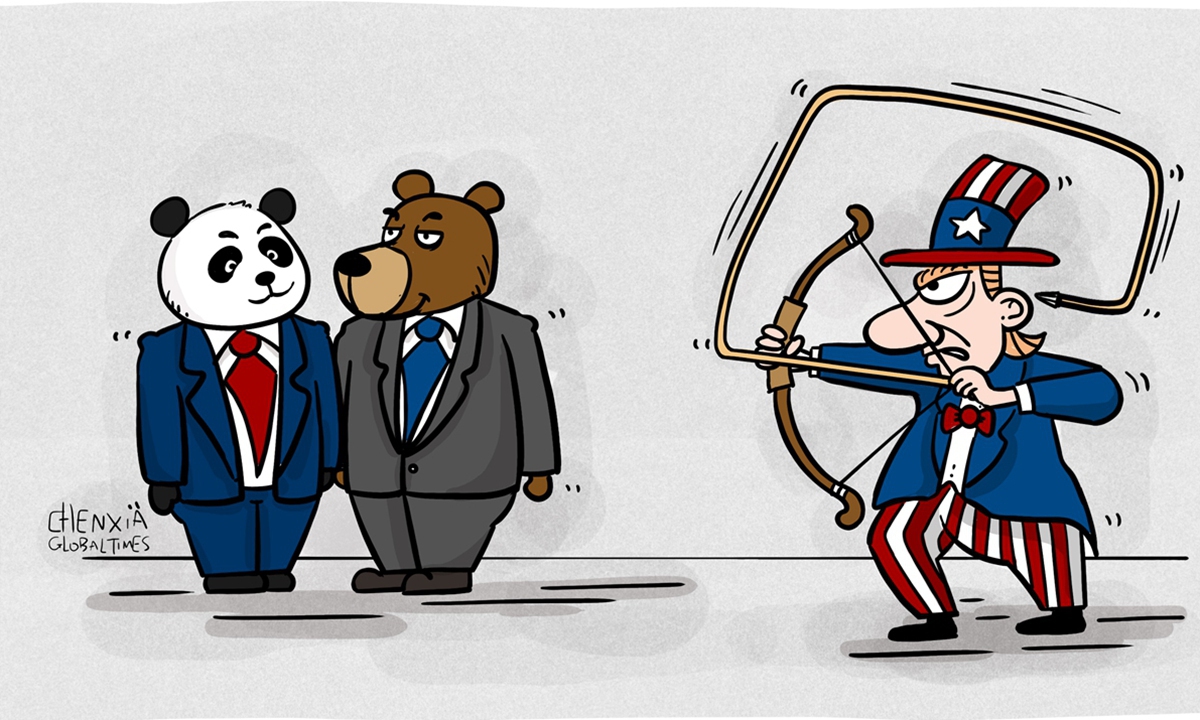
Illustration: Chen Xia/GT
It is normal to see fluctuations in the monthly readings for China's exports to Russia, but those figures have been ironically cited by some Western media outlets as evidence of the effectiveness of the illegal US sanctions on Russia. Their self-deceiving propaganda is merely bravado.
The Voice of America has published an article distorting and hyping a decline in China's April exports to Russia, attributing the drop to the impact of US sanctions. It is a bit ironic that while Western media outlets try to smear and criticize China's trade with Russia by focusing on short-term fluctuations, they lose sight of the bigger picture.
China and Russia in recent years have further strengthened strategic coordination and achieved new results in mutually beneficial cooperation. Although customs data showed that China's exports to Russia fell to 59.03 billion yuan ($8.17 billion) in April 2024 from 66.19 billion yuan in April 2023, exports from China to Russia increased in the first four months this year.
Trade between China and Russia grew steadily in recent years. In 2023, bilateral trade reached $240.1 billion, achieving the target of $200 billion ahead of schedule, which shows the strong resilience and broad prospects for mutually beneficial cooperation.
Trade and economic cooperation serve as key pieces in the jigsaw puzzle of China-Russia relations and enjoy great potential. Bilateral economic cooperation has advanced steadily not just in traditional fields such as energy, agriculture and forestry, but also in sectors including vehicles, home appliances and food processing.
This is the natural result of economic complementarity. To take the example of agriculture, Russia's flour, beef, ice cream and some other agricultural products are favored by Chinese consumers, while made-in-China agricultural machinery and types of food-processing equipment are widely recognized by Russian farmers and companies.
Economic cooperation between China and Russia is mutually beneficial. Their cooperation neither targets any third party, nor is it influenced by a third party, let alone is it subject to interference and provocation by any third party.
The US recently imposed sanctions on about 20 Chinese companies for allegedly supporting Russia's military-industrial and energy development. The move is a typical example of economic coercion, unilateralism, and bullying. China's right to conduct normal economic exchanges with Russia and other countries on the basis of equality, mutual benefit and common development should not be infringed on.
In recent years, the US has frequently used long-arm jurisdiction to abuse state power and arbitrarily place restrictions on trade and investment. Washington may try to drive a wedge to disrupt economic cooperation not only between China and Russia, but also between China and other countries and regions. This hegemonic approach has seriously disrupted the normal international economic and trade order and brought economic shocks to the global industrial chains. It will inevitably face a powerful backlash from people across the world.
As the global economy has entered a period of uncertainty and volatility partly due to the unilateralism and hegemonic practices of the US, developing countries, including China and Russia, should be further strengthening and consolidating their cooperation based on mutual respect, trust and understanding. They should address specific issues that hinder the further development of their economic and trade ties.
The challenges encountered by trade between China and Russia in the process of rapid development are controllable and can be solved through appropriate means. Both countries have the confidence, conditions and ability to further expand and deepen their mutually beneficial cooperation in various fields. For instance, Russian Deputy Foreign Minister Andrey Rudenko was quoted by Russian news agency TASS as saying in February that Moscow is confident that the issues related to payments with China will be solved.
As the US escalates sanctions against Russia, the world is under pressure over its banks accepting payments from Russian companies, but it is believed that remaining problems will be gradually resolved, because it is consistent with the efforts by countries, especially developing economies, to ensure financial security and stability.




